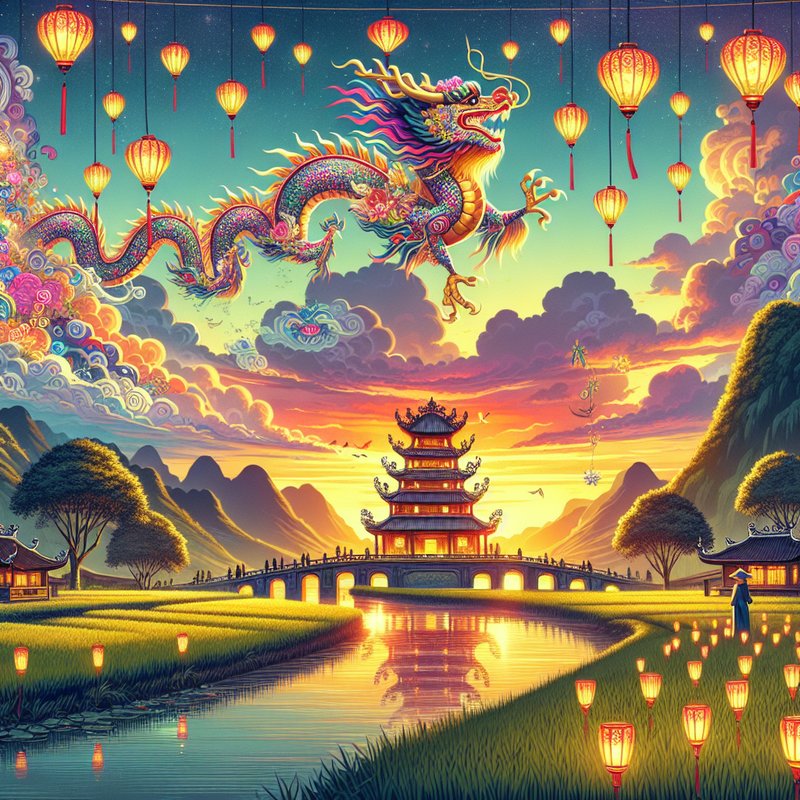Tet Nguyen Dan: The Vietnamese New Year

Tet Nguyen Dan, commonly referred to as Tet, is Vietnam’s most significant and widely celebrated festival. Marking the arrival of spring, it occurs in late January or early February, based on the lunar calendar. The festival is a time for family reunions, paying homage to ancestors, and welcoming the new year with hope and joy.
The preparations for Tet are elaborate and steeped in tradition. Homes are meticulously cleaned and decorated, and special Tet foods such as Banh Chung and pickled onions are prepared. The streets come alive with vibrant markets selling flowers, ornaments, and festive goods. Each aspect of Tet reflects Vietnam’s deep-rooted customs and the importance of family and community bonds.
During the holiday, numerous activities unfold, such as traditional lion dances, fireworks displays, and visiting pagodas to pray for luck and prosperity. Tet not only showcases Vietnam’s cultural richness but also provides a heartfelt glimpse into the country’s emphasis on harmony and renewal.
Mid-Autumn Festival: A Celebration Under the Full Moon

The Mid-Autumn Festival, known as Tet Trung Thu, is one of Vietnam’s most cherished festivals, taking place on the 15th day of the eighth lunar month. It’s primarily a celebration for children, filled with fun activities and symbolizing the harvest and family unity. The festival is marked by colorful lantern processions, mooncakes, and dragon dances.
Parents give their children lanterns, toys, and masks, while families gather to enjoy mooncakes and fruits under the full moon. Each mooncake, filled with various sweet and savory ingredients, carries cultural symbolism related to familial love and prosperity. Markets teem with traditional toys, masks, and lanterns, creating an enchanting atmosphere that captivates all who participate.
This festival isn’t just for children; it’s a heartfelt event that strengthens family ties and cultural heritage. It offers visitors a delightful experience where they can engage with local customs, taste festive delicacies, and immerse themselves in the lively and affectionate spirit of Vietnamese families.
Hue Festival: A Cultural Extravaganza in the Imperial City

The Hue Festival, held biennially in the city of Hue, is a cultural feast that celebrates Vietnam’s historical and cultural heritage. Hue, once the capital of the Nguyen dynasty, hosts this festival that spans a week and features a wide array of events that include traditional art performances, historical reenactments, and culinary showcases.
Visitors to the Hue Festival can witness grand spectacles such as the Ao Dai fashion shows, traditional court music performances, and folk games. The festival revitalizes Hue’s imperial atmosphere, with illuminated citadels, palaces, and iconic landmarks setting the stage for an unforgettable journey through Vietnam’s royal past.
More than just a celebration of history, the Hue Festival promotes cultural exchange by inviting international artists and performers. This creates a global platform where traditions from around the world converge in mutual appreciation, making the festival a poignant symbol of peace and cultural understanding.
Lunar New Year’s Festivals: Regional Variations Across Vietnam

While Tet Nguyen Dan is celebrated nationwide, various regions in Vietnam have their unique traditions and customs to welcome the Lunar New Year. These regional festivals highlight the diversity within Vietnamese culture and offer visitors a chance to experience local customs firsthand.
In the Northern regions, for example, there are water puppet shows and firework displays, while Central Vietnam is known for its traditional games and culinary festivals. Meanwhile, in the Southern regions, lion dance performances dominate the streets, and flower street exhibitions showcase the vibrant flora of the Mekong Delta.
Each region brings an exclusive flavor to the Lunar New Year celebrations, reflecting local beliefs and practices. This diverse tapestry of festivities enriches Vietnam’s cultural landscape and provides travelers with a broad spectrum of experiences, making every visit during the Lunar New Year a unique cultural expedition.

Leave a Reply